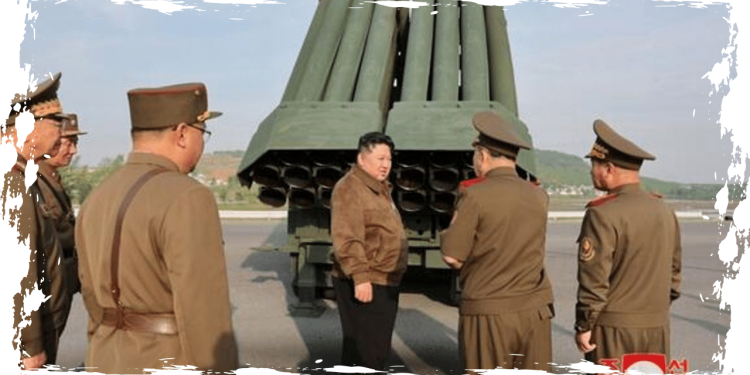North Korea announced on Tuesday that its latest effort to launch a new rocket carrying a reconnaissance satellite failed due to a midair explosion during the flight of its first-stage rocket this week.
According to the Korean Central News Agency, the vice general director of the North’s National Aerospace Technology Administration stated that the rocket carrying the satellite, the Malligyong-1-1, exploded after taking off from the Sohae Satellite Launching Ground on the country’s northwest coast on Monday.
The launch took place just hours after South Korean President Yoon Suk Yeol, Japanese Prime Minister Fumio Kishida, and Chinese Premier Li Qiang met in Seoul to reaffirm their commitment to promoting peace on the Korean peninsula.
It defied international warnings and condemnation, stating that any launch employing ballistic missile technology, including that of a space launch vehicle, violates United Nations Security Council resolutions.
“The launch failed due to the air blast of the new-type satellite carrier rocket during the first-stage flight,” the KCNA stated, citing a NATA official.
A preliminary study by experts from the North’s launch preparatory committee concluded that the “accident” was due to the operating reliability of a new “liquid oxygen plus petroleum” engine, according to the official.
The KCNA reports that investigators will also look into the other causes of the collapse.
Shortly after the launch, South Korea’s Joint Chiefs of Staff (JCS) stated that the North’s rocket ended up as “multiple pieces of debris,” implying that the satellite launch failed.
On Monday, at 10:44 p.m., JCS detected the rocket’s launch southward over the Yellow Sea from the Tongchang-ri area in the country’s northwest.
A preliminary examination by onsite experts from the North’s launch preparation team stated that the “accident” appears to be due to the operating credibility of a “liquid oxygen plus petroleum” engine, according to the deputy chief of the aerospace administration.
“(They will also look into problems that could be other causes [of the failure],” the KCNA stated in its report.
Shortly after the launch, South Korea’s Joint Chiefs of Staff stated that the North’s rocket ended up as “multiple pieces of debris,” implying that the satellite launch plan failed.
On Monday, at 10:44 p.m., JCS detected the rocket’s launch southward over the Yellow Sea from the Tongchang-ri area in the country’s northwest.
As a safety precaution, Pyongyang had already warned Japan of its intention to launch a satellite before June 4 and had selected three regions where rocket debris was likely to land. The liftoff occurred on the first day of the eight-day launch window.
The stubborn regime intends to send three satellites into space this year. In November, it successfully launched its first military spy satellite into orbit.
The presidential National Security Office briefed President Yoon on the launch shortly after it occurred, according to his office. National Security Advisor Chang Ho-jin presided over a gathering of top presidential security officials.
According to the office, the meeting participants condemned the launch as a breach of UNSC resolutions and provocative conduct that jeopardizes peace and security on the Korean Peninsula, in Northeast Asia, and throughout the international community.
The US Indo-Pacific Command blasted the North’s rocket launch, stating that it is closely monitoring the situation with friends and partners.
“We are aware of the DPRK’s May 27 launch using ballistic missile technology, which, is a brazen violation of multiple unanimous UNSC resolutions and raises tensions and risks destabilizing the security situation in the region and beyond,” the military said in a statement.
The North’s official name is the Democratic People’s Republic of Korea, or DPRK.
On Monday, the South Korean military warned that it would respond to the North’s launch plan with “powerful” measures and performed air drills employing modern fighter jets near the inter-Korean border as a show of force.
The rocket launch occurred despite suspicions that increased military collaboration between the North and Russia could have aided Pyongyang’s space rocket launch capability and other military activities.
According to observers, the North appears to want to secure intelligence, surveillance, and reconnaissance assets since it is far behind the allies in ISR capabilities, despite its emphasis on creating a variety of lethal weapons systems, including submarine-launched ballistic missiles and tactical nuclear weapons.










